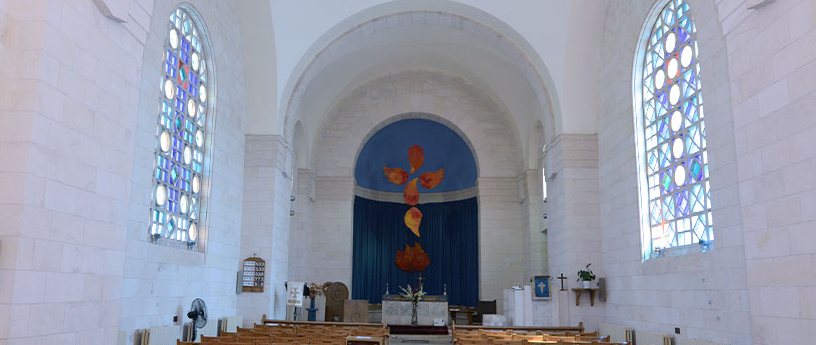Christmas Day, December 25 2014
Isaiah 52.7-10; Psalm 98; Hebrews 1.1-12; John 1.1-14
St Andrew’s Scots Memorial Church, Jerusalem
How are we to understand ourselves and our world? What story can we tell to make sense of it all?
Well, there is, to begin with, the secular story we tell ourselves, using the sciences and the humanities. It’s a secular story because anyone can tell it. It doesn’t require religious faith. But, by the same token, it’s a story without God.
In a secular culture, how is God to get our attention? Especially when God refuses to indulge in the pyrotechnics we might expect of a proper, self-respecting God.
It seems to me that God gets our attention in three ways.
*
First, by creating us and the world in which we live. Without creation, there wouldn’t be a world, there wouldn’t be you or me, there wouldn’t any us for God to get our attention.
But it’s a subtle strategy – critics might say, excessively so. For creation makes no difference to the world. It doesn’t make the world to be this way rather than that. It doesn’t make you or me to be this way rather than that.
We can’t look at any feature of the world and say triumphantly, “Look, see – God.” We can’t say to the sceptics, “You may think the world isn’t created; but consider, if you will, the duck-billed platypus.”
Not how the world is but that it is is the mystery.
Why is there a world rather than nothing? The answer is God; but it’s not an answer that stares us in the face.
*
But God is not done yet. God has another trick up God’s sleeve – the spirit that God pours quietly into our hearts. This spirit is at the root of all our religious traditions and allows us to do whatever good we do.
But to a secular mind, God’s spirit is not at all obvious; and the secular mind has self-interest on its side. It is more to our credit to claim the credit for the little good we do – ignoring the spirit tugging at our heartstrings, turning us in the right direction, and leading us by the hand.
*
So far, what I have said might be said by Muslims or Jews, although they might perhaps ask me to say it less flippantly. And it might be said in other and sometimes dramatically different ways by our other religious traditions.
But God is still not done. God, it seems to me, has yet a third and final trick: God comes to us in human form. Christmas shows us who God is; Good Friday shows us who we are; and Easter tells us that God has the last laugh.
Of all these three, only Good Friday is straightforward. It shows that we are the sort of people who kill the innocent, who nail a nuisance to a cross. We didn’t need the US Senate report on torture or the insane antics of ISIS to tell us this is true. We are the species that messes up big time.
But Christmas and Easter are mysteries, just as mysterious as creation. A God who becomes man, a God who raises a dead man from the dead – a secular mind can make nothing of such things, any more than it can entertain the idea of a created world. Christmas is surely a fairytale or even a contradiction in terms.
Let me take these two suspicions in reverse order.
*
How can God become man? The short answer is we don’t know. We don’t understand what it means for someone to be both God and human, because we don’t understand what it means to be God. But we can at least make a stab at showing that it’s not a contradiction in terms – because God is not like a circle or a sheep.
No matter how hard we try to square the circle, a circle can’t at the same time be a square. Circles and squares are shapes, occupying the same logical space; and one excludes the other.
In the same way, a man can’t at the same time be a sheep, even though men may often look sheepish, especially when their wives or significant others are explaining to them in short, easy words their imperfections. Sheep and human beings are two distinct kinds of living creatures: you can be one or the other, but not both.
But God and human beings are not in the same case. You can’t add God and me and get two, any more than you can add God and the world and get two: two what? God doesn’t occupy the same logical space as any created thing or even the whole creation put together. This is part of what it means to say that God is transcendent: God transcends all our human categories.
So it is certainly odd, it is certainly unexpected, but it is not impossible for God to become man.
But even if our secular world can get its head round this logical point, it may still be inclined to regard the incarnation as a fairytale, especially when we consider all the stories and all the tinsel with which we surround the claim that the Word became flesh.
And here, I’m sorry to say, we have no easy answer. We cannot beat the secular world into submission. We cannot batter ourselves into submission. We are left with John Betjeman’s question:
And is it true? and is it true?
The most tremendous tale of all,
Seen in a stained-glass window’s hue,
A baby in an ox’s stall?
The maker of the stars and sea
Become a child on earth for me?
And is it true? For if it is,
No loving fingers tying strings
Around those tissued fripperies,
The sweet and silly Christmas things,
Bath salts and inexpensive scent
And hideous tie so kindly meant,
No love that in a family dwells,
No carolling in frosty air,
Nor all the steeple-shaking bells
Can with this single truth compare –
That God was man in Palestine
And lives today in bread and wine.
Is it true? You pays your money, and you makes your choice.
If we say it is true, then God gets our attention.
The question, as we turn the calendar to start on another New Year, is whether God can keep it.
Read more
Herbert McCabe, God Matters (London: Geoffrey Chapman, 1987)

